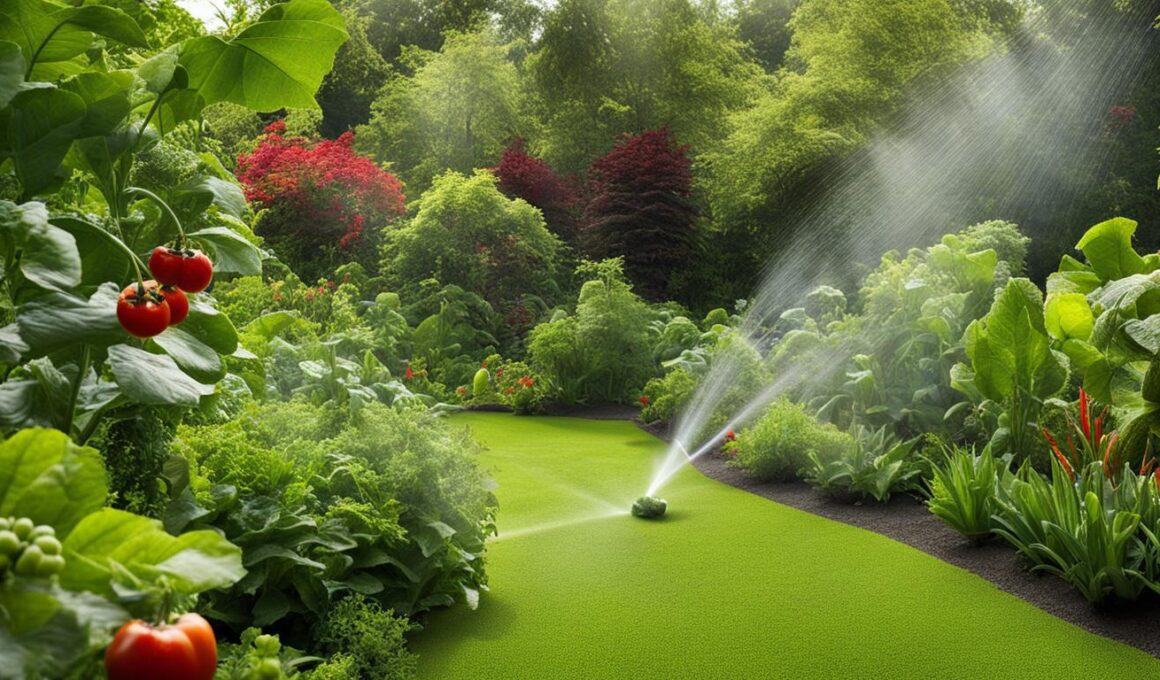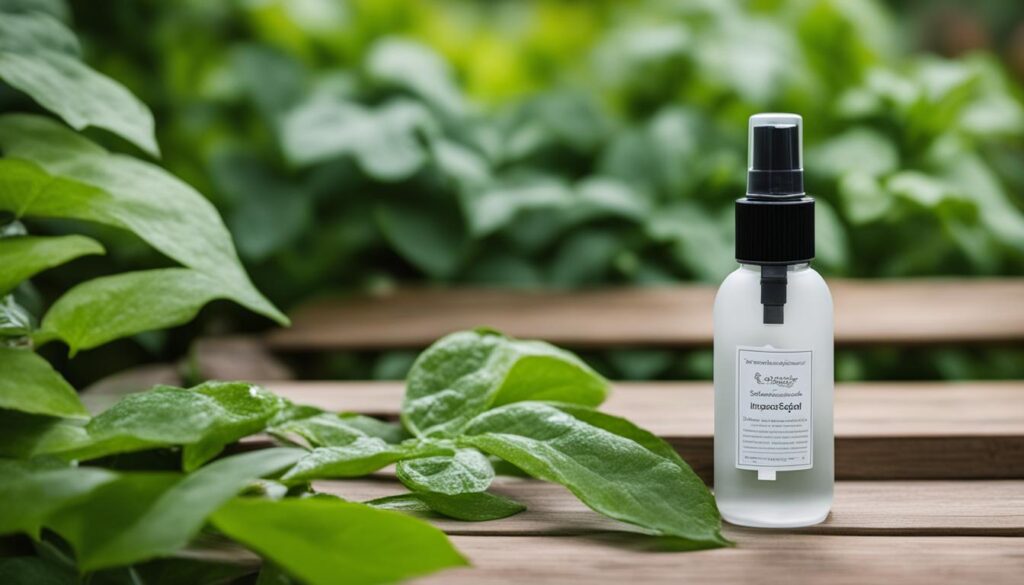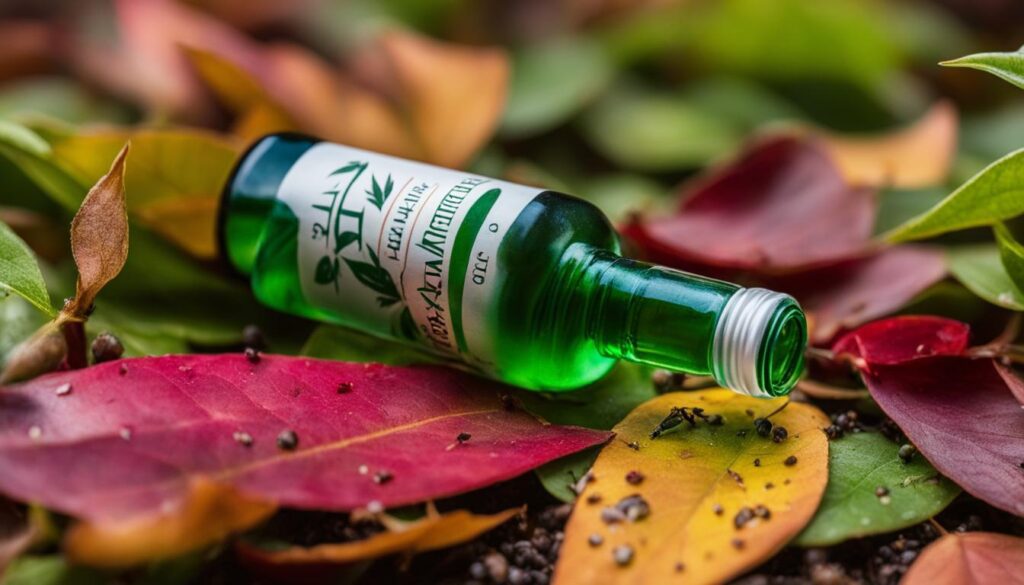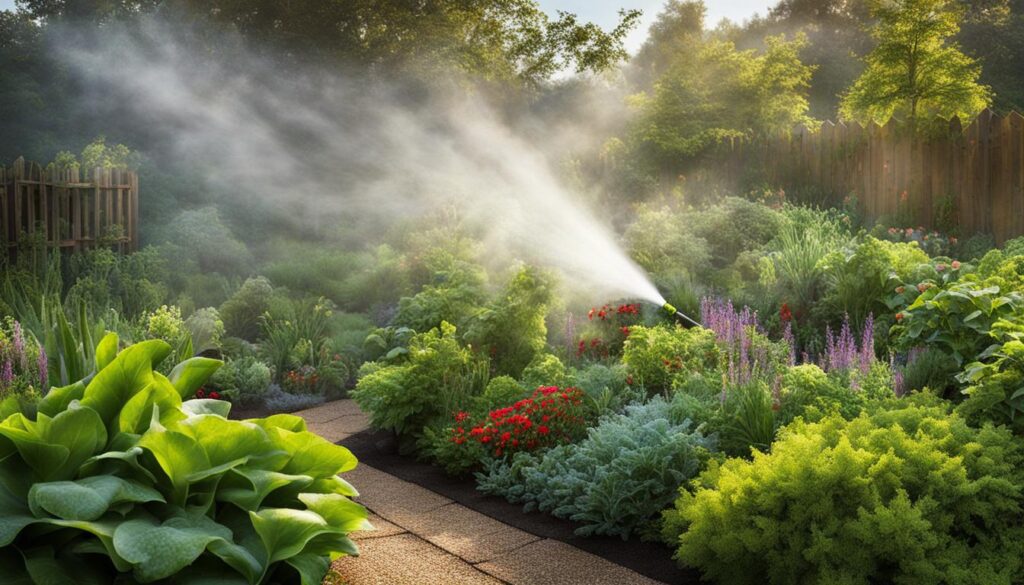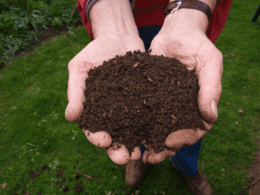Welcome to our guide on effective bug sprays for your garden. If you’re looking for sustainable and eco-friendly solutions to keep pesky bugs away from your plants, we have the answers you need. In this article, we’ll explore homemade insect sprays and deterrents that are not only effective but also safe for your garden and the environment.
From garlic and nettle sprays to insecticidal soap and neem oil bug spray, we’ll cover a variety of options that you can easily make at home. We’ll also delve into the benefits of plant diversity and companion planting in reducing pests and creating a harmonious garden ecosystem. Say goodbye to harmful chemicals and hello to natural bug control!
Key Takeaways:
- Homemade sprays like garlic, nettle, soap, tomato, and basil can effectively deter aphids, mites, and thrips.
- Insecticidal soap is a popular bug spray made with vegetable oil, dishwashing soap, and water.
- Neem oil bug spray is an organic insecticide that is safe for beneficial insects and pets.
- Vinegar spray can repel aphids and other pests while being a natural bug killer for plants.
- Garlic spray and tomato leaf spray are natural repellents that can be made using household ingredients.
By utilizing these eco-friendly bug sprays and implementing companion planting techniques, you can keep your garden pest-free and healthy without relying on harmful chemicals. Let’s dive in and discover the solutions that will help you maintain a thriving garden!
Homemade Insecticidal Soap Spray for Garden Bugs
Insecticidal soap is a popular and effective solution for controlling a wide range of garden pests. Made with simple ingredients, including soap, oil, and water, homemade insecticidal soap spray can help eliminate aphids, lacebugs, leafhoppers, mealybugs, and thrips from your plants.
To make your own insecticidal soap spray, you can follow this recipe: combine one cup of vegetable oil with one tablespoon of dishwashing soap or pure Castile liquid soap. Dilute the mixture with water and transfer it to a spray bottle. Shake the bottle well before applying the spray to your plants, making sure to cover both sides of the leaves.
It’s important to note that insecticidal soap spray works by suffocating the pests upon contact, so it must come into direct contact with the insects to be effective. For optimal results, reapply the spray every few days or after rainfall to ensure that new generations of pests are also targeted.
Table: Comparing Homemade Insecticidal Soap Spray with Other Bug Control Methods
| Method | Effectiveness | Eco-friendly | Cost |
|---|---|---|---|
| Homemade Insecticidal Soap Spray | Effective against aphids, lacebugs, leafhoppers, mealybugs, and thrips | Yes | Low |
| Chemical Bug Sprays | Effective against various pests | No | High |
| Companion Planting | Moderate effectiveness | Yes | Low |
| Neem Oil Spray | Effective against a wide range of pests | Yes | Moderate |
Pros of Homemade Insecticidal Soap Spray:
- Environmentally friendly alternative to chemical pesticides
- Effective against a range of common garden pests
- Simple and affordable to make at home
- Gentle on plants
Cons of Homemade Insecticidal Soap Spray:
- May require frequent reapplication for optimal pest control
- Not effective against all types of garden pests
- Can be harmful to beneficial insects if not used judiciously
Neem Oil Bug Spray for Garden Pests
Neem oil is an organic insecticide that has been used for thousands of years in India. It is derived from the neem tree and is known for its effectiveness against a wide range of garden pests. The active compounds in neem oil disrupt the life cycle of insects, preventing them from breeding and causing damage to plants.
To make neem oil bug spray, you can mix one to two tablespoons of pure, cold-pressed neem oil with a gallon of water. This mixture can then be sprayed onto plants, focusing on the leaves and stems where pests tend to gather. Adding a few drops of dish soap to the spray can help the neem oil adhere to the plant’s surface.
Neem oil is safe to use around pets, birds, and beneficial insects, making it a preferred choice for eco-conscious gardeners. It works by getting absorbed into the plant’s tissue, meaning it only affects insects that ingest the treated plant. This targeted approach minimizes harm to beneficial insects and maintains a healthy balance in your garden ecosystem.
Regular use of neem oil bug spray can help control common garden pests such as mites, whitefly, aphids, thrips, and mealybugs. It is important to apply the spray thoroughly, targeting both the upper and lower surfaces of the leaves, as well as the stems. Reapply the spray every 7-14 days or after heavy rain to ensure continued protection against pests.
Benefits of Neem Oil Bug Spray:
- Organic and eco-friendly alternative to chemical insecticides.
- Effective against a wide range of garden pests.
- Safe for pets, birds, and beneficial insects.
- Targets pests that ingest treated plants, minimizing harm to beneficial insects.
- Helps maintain a healthy ecosystem in your garden.
Neem oil bug spray is a valuable tool in organic pest control. Its effectiveness and safety make it a popular choice for gardeners looking to protect their plants without harsh chemicals.
Vinegar Spray for Garden Pest Control
Vinegar is a versatile ingredient with many household uses, including its effectiveness as a natural bug killer for plants. Vinegar spray is an eco-friendly solution to combat a wide range of garden pests. To create a simple and effective vinegar spray, combine one cup of white vinegar with three cups of water. Adding a few drops of dishwashing soap can help the solution adhere to plants and improve its effectiveness.
Vinegar spray is particularly useful for controlling aphids, those pesky little insects that can quickly infest your plants. Simply spray the affected areas, making sure to cover both the tops and undersides of the leaves. Vinegar spray can also deter ants and other scent-driven pests. For best results, it is important to spray under the leaves, as this is where pests like to lay their eggs, such as whitefly eggs.
Using vinegar spray as a natural bug killer for plants not only helps protect your garden but also ensures that you are keeping it free from harmful chemicals. Vinegar is a safe and environmentally friendly option that won’t harm beneficial insects or pose a risk to pets and wildlife. Incorporating vinegar spray into your pest control routine can be an effective and sustainable way to keep your garden healthy and pest-free.
Table: Vinegar Spray Recipe
| Ingredients | Measurement |
|---|---|
| White vinegar | 1 cup |
| Water | 3 cups |
| Dishwashing soap | A few drops |
Garlic Spray for Garden Insects
If you’re looking for a natural and effective way to repel bugs from your garden, consider using garlic spray. Garlic spray is a homemade insect repellent that can help keep pests like aphids, slugs, and carrot fly at bay. It’s easy to make and can be used as a treatment for existing infestations or as a preventative measure to deter bugs from damaging your plants.
To make garlic spray, start by pureeing two garlic bulbs in a food processor or blender. Next, combine the pureed garlic with vegetable oil and let it sit overnight. Strain the mixture to remove any solid particles and add a small amount of mild liquid soap. Finally, dilute the garlic mixture with water, usually at a ratio of one part garlic mixture to ten parts water, and pour it into a spray bottle.
To use garlic spray, simply spray it onto the leaves of your plants, focusing on areas that are most susceptible to bug damage. The strong odor of garlic acts as a deterrent, making your plants less attractive to pests. Garlic spray should be reapplied every few days or after heavy rainfall to ensure its effectiveness.
Benefits of Garlic Spray:
- Effective natural insect repellent
- Safe for plants, pets, and beneficial insects
- Easy to make at home with common ingredients
- Reduces the need for harmful chemicals in your garden
- Can be used as a treatment or preventative measure
Using garlic spray is a sustainable and eco-friendly way to protect your garden from insect pests. It’s a natural alternative to chemical insecticides and can help maintain a healthy and thriving garden. Give garlic spray a try and enjoy the benefits of a bug-free garden!
Tomato Leaf Spray for Garden Pests
If you’re looking for a natural and effective way to control pests in your garden, tomato leaf spray is a great option. Tomato leaves contain alkaloids, which have insecticidal properties that can help eliminate aphids and mites. This organic pest control method is easy to make and can be a sustainable solution for keeping your plants healthy.
To create tomato leaf spray, start by chopping up tomato leaves and placing them in a container. Add water to cover the leaves and let the mixture steep overnight. The alkaloids from the leaves will infuse into the water, creating a potent insecticide. Strain the mixture to remove the leaf particles, and your tomato leaf spray is ready to use.
To apply the spray, simply pour it into a spray bottle and mist your plants, making sure to cover both the upper and lower surfaces of the leaves. Pay extra attention to areas where pests are commonly found. The tomato leaf spray will work to deter and eliminate aphids and mites, protecting your plants from damage.
What Are Some Safe and Effective Solutions to Keep Bugs Away from Indoor Plants as Well?
When it comes to protecting your indoor plants from pests, using an indoor plants insecticide is a safe and effective solution. Natural insecticidal soaps, neem oil, and diatomaceous earth are some options to keep bugs away without harming your plants. Regularly inspecting your plants and maintaining proper hygiene also helps in preventing insect infestations.
Conclusion
Keeping your garden pest-free and healthy is possible using eco-friendly solutions. Homemade bug sprays made from ingredients like insecticidal soap, neem oil, vinegar, garlic, tomato leaves, and cinnamon can effectively control pests without harmful chemicals.
Additionally, promoting plant diversity and using companion planting techniques can help create a balanced ecosystem in your garden. By incorporating a variety of plants and strategically placing them together, you can naturally deter pests and improve the overall health of your garden.
By using these methods and paying attention to your plants, you can maintain a healthy garden and minimize the need for bug sprays. Regularly inspect your plants for signs of pests, practice good hygiene by removing any infested plants or debris, and provide proper care to keep your garden thriving.
Remember, a thriving garden is not just a beautiful sight but also a haven for beneficial insects and wildlife. Embracing eco-friendly practices not only protects the environment but also ensures that your garden remains a sanctuary for both you and nature.
FAQ
What pests can homemade insect sprays and deterrents effectively control?
Homemade insect sprays and deterrents can effectively control pests such as aphids, mites, thrips, lacebugs, leafhoppers, mealybugs, whitefly, slugs, and carrot fly.
What are some eco-friendly options for dealing with garden bugs?
Some eco-friendly options for dealing with garden bugs include insecticidal soap, neem oil bug spray, vinegar spray, garlic spray, tomato leaf spray, and cinnamon spray.
How do you make insecticidal soap spray at home?
To make insecticidal soap spray, combine one cup of vegetable oil with one tablespoon of dishwashing soap or pure Castile liquid soap. Dilute the mixture with water and spray it onto plants to get rid of pests like aphids, lacebugs, leafhoppers, mealybugs, and thrips. Reapply every few days or after rain.
How can neem oil bug spray be made?
To make neem oil bug spray, mix one to two tablespoons of pure, cold-pressed neem oil with a gallon of water. You can also add dish soap to help the neem oil adhere to the plants. Neem oil is effective against pests like mites, whitefly, aphids, thrips, and mealybugs.
How can vinegar be used as a bug spray?
To use vinegar as a bug spray, mix one cup of white vinegar with three cups of water. Adding dishwashing soap to the mix can help the solution adhere to plants. Vinegar spray is effective against aphids and can repel ants and other scent-driven pests.
How can garlic spray be made at home?
To make garlic spray, puree two garlic bulbs with vegetable oil, let it sit overnight, strain it, and add mild liquid soap and water. This mixture can be applied to plant leaves to repel pests like aphids, slugs, and carrot fly.
How do you make tomato leaf spray for garden pests?
To make tomato leaf spray, chop up tomato leaves and mix them with water. Let the mixture steep overnight, strain it, and then apply it to the plant’s leaves. Tomato leaf spray is effective against aphids and mites.





